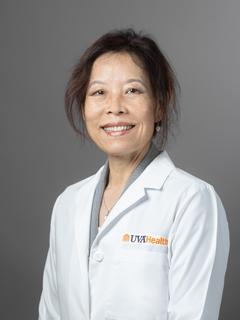Movement Disorders Fellowship Program
Movement Disorders Fellowship Program
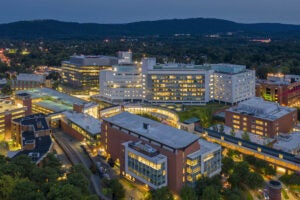
Letter from Program Director
Welcome to the UVA Movement Disorders Fellowship. At UVA we have a tradition of clinical and educational excellence. The division of Parkinson’s Disease and Movement Disorders has trained residents and fellows over many years under the mentorship of G. Frederick Wooten, MD and Madaline Harrison, MD. The division’s Movement Disorders Fellowship program formally began in late 2015 under the guidance of Binit Shah, MD, former Program Director, and current division chief. The first fellow started in July 2017, and since that time we have successfully matched a fellow every year into our 2-year program. Our current graduates have taken positions in both private practice and academic institutions, as well as significant leadership positions. While young and growing, our program has the resources, expertise, and faculty mentorship to produce leaders in the next generation of movement disorders specialists.
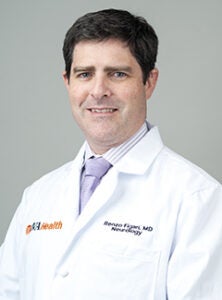
Training and Assignment Overview
The Fellowship is a 2-year program targeted to maximize clinical acumen of our fellows, with opportunities to also participate in clinical research, in order to support their growth as future movement disorders neurologists.
First Year:
The first year is comprised of 4-week rotations with 40 half-day blocks divided into 15 General Movement Disorders clinics, 8 DBS Programming clinics, 6 Chemodenervation clinics, 2 Huntington Disease multidisciplinary clinics, 1 Pediatric movement Disorders clinic, 1 Memory clinic, and 7 blocks for research time. The goals and objectives of the first year are divided into clinical and research components. Clinically, we aim to provide a strong clinical foundation with exposure to multiple patients that will give a diverse view of movement disorders pathology. Introduction to the division’s research environment will include participating in on-going clinical trials and generating new hypotheses using the Movement Disorders clinic database.
First Year Sample Schedule
Movement Disorder Academic Schedule.xlsx
1ST YEAR MOVEMENT DISORDER FELLOW
4 WEEK CYCLE
MON TUES WED THURS FRI
WEEK 1 AM Gen Mov Clinic
Staff DalrympleDBS
Staff Dalrymple/FigariGen Mov Clinic
Staff FigariBotox
Staff ShahGen Mov Clinic
Staff Figari
PM Memory Clinic
Staff D'AbreuDBS
Staff Dalrymple/FigariGen Mov Clinic
Staff ShahAdmin/Research Admin/Research
WEEK 2 AM Gen Mov Clinic
Staff DalrympleDBS
Staff Dalrymple/FigariBotox
Staff FigariPeds Mov
Staff Abu Libdeh/GarrisGen Mov Clinic
Staff Figari
PM Botox
Staff DalrympleDBS
Staff Dalrymple/FigariGen Mov Clinic
Staff ShahAdmin/Research Admin/Research
WEEK 3 AM Gen Mov Clinic
Staff DalrympleDBS
Staff Dalrymple/FigariBotox
Staff FigariHD Clinic
Staff DalrympleGen Mov Clinic
Staff Figari
PM Botox
Staff DalrympleDBS
Staff Dalrymple/FigariGen Mov Clinic
Staff ShahHD Clinic
Staff DalrympleAdmin/Research
WEEK 4 AM Gen Mov Clinic
Staff DalrympleDBS
Staff Dalrymple/FigariGen Mov Clinic
Staff FigariBotox
Staff ShahGen Mov Clinic
Staff Figari
PM Gen Mov Clinic
Staff Figari/ShahDBS
Staff Dalrymple/FigariGen Mov Clinic
Staff ShahAdmin/Research Admin/Research
Second Year:
The second year is tailored to each fellow’s interest and career goals. The fellow will be able to customize his/her schedule to complete research projects and achieve goals for a smooth transition into a research or clinical practice.
Didactics:
Weekly didactic sessions include a rotation of:
- Video rounds where fellows present, describe phenomenology, differential diagnosis, and diagnostic/treatment plans of interesting patient cases.
- Journal club.
- Research conference.
- Lecture series presented by the fellows.
Highlights of training at the University of Virginia:
- Combined clinical and research training.
- Multidisciplinary Huntington’s Disease and Atypical Parkinsonism clinics.
- Pediatric Movement Disorder clinic.
- Training in Neurocognitive disorders.
- Early exposure to DBS clinic and multidisciplinary selection conference.
- Early hands-on experience with botulinum toxin injections techniques, both with and without EMG guidance.
- Flexibility of second year with protected time for research, education, and/or conferences.
- Opportunities for resident and medical student teaching, both formally and informally
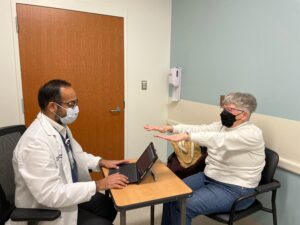
How to Apply for the Fellowship Program
The movement disorders fellowship at UVA is a non-ACGME accredited program that utilizes the San Francisco match for its application. All applications should come through the SF Match. We recommend that applicants interested in training at UVA include in their personal statement a summary of career goals, and research interest. Applications should be submitted during the PGY3 year. Applicants must have successfully completed a neurology residency program before entering this fellowship.
Information for International Graduates
We accept international medical graduates and support J1 visa applicants. Graduates of medical schools outside the USA or Canada are required to have an ECFMG certificate before the start of the fellowship.
For specific dates please review the timeline posted at the SF Match.
- Registration and application start through the SF Match around March of the year prior to starting fellowship (March of the applicant’s PGY3 year).
- Invitations for interview are sent in June until all spaces are filled. We have limited interview slots so a late application can affect your opportunity to interview at UVA.
- We conduct interviews on Fridays between the months of July and August.
- Rank list is summited in early September.
- Match results are announced late September.
Diversity, Equity, and Inclusion
As employees of UVA, fellows participate of training in preventing and addressing discrimination, harassment, and retaliation, and delivering compassionate care to patients who are LGBTQ+. The UVA Division of Diversity, Equity, and Inclusion assists and monitors all units of the University in their efforts to recruit and retain faculty, staff, and students from historically underrepresented groups and to provide affirmative and supportive environments for work and life at the University of Virginia
Core Faculty Members
Xuemei Huang, M.D.
Department Chair of Neurology
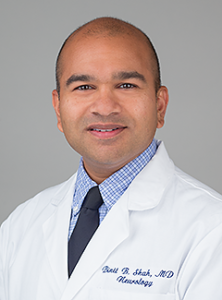
Binit Shah, M.D.
Division Chief of Neurology
Associate Fellowship Professor

Alissa Higinbotham, M.D.
Assistant Professor of Neurology
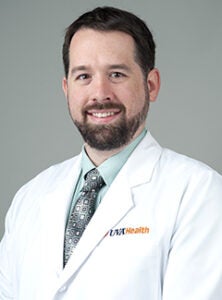
William A. Dalrymple, M.D.
Neurology Program Director
HD Clinic Director
Current Fellow
Dylan Gonzales, MD
Dr. Gonzales is excited to be at UVA, providing care to such a vibrant and welcoming community. He completed both his undergraduate and medical education at the University of South Carolina.
Outside of medicine, he enjoys spending time with his family. Dr. Gonzales looks forward to meeting the wonderful patients in our community and contributing to their health and well-being in any way he can.
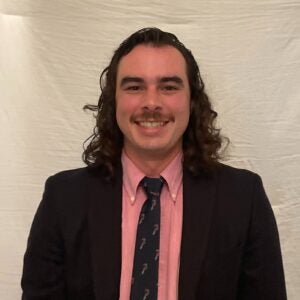
Kristina Cain, M.D.
Dr. Cain is thrilled to be at UVA, where she has the opportunity to learn more about movement disorders from some of the very best in the field. She is eager to expand her clinical knowledge and research experience, and to contribute meaningfully to the care of patients living with these complex conditions. Dr. Cain is also excited to collaborate with a dedicated team of experts and to grow both personally and professionally during his time at UVA.
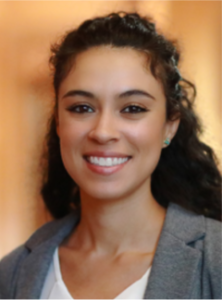
Former Fellows
Philip Lee, M.D. (Graduated 2025) Roanoke Carilion
Sajid H. Shaikh, M.D. (Graduated 2024) Assistant professor at Aka Khan University, Karachi, Pakistan
Matthew Burton, M.D. (Graduated 2023) Marshall University, Huntington, WV
Patrick W. Kerns. M.D. (Graduated 2022) Christiana Care, Newark, DE
W. Alex Dalrymple, M.D. (Graduated 2021) UVA Health System, Charlottesville, VA
Hannah W. Irving, M.D. (Graduated 2020) Inova, Fairfax, VA
Cody Scott Freeman, M.D. (Graduated 2019) Bon Secours, Greenville, SC
Daniel O. Claassen, M.D., MS (Graduated 2011) Division Chief, Behavioral and Cognitive Neurology, Vanderbilt University Medical Center, TN
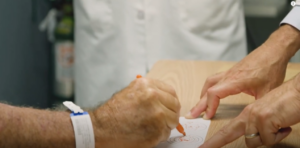
Support the Education of future Movement Disorder Specialist
The success of the Parkinson’s Disease and Movement Disorders fellowship depends on the support by patients and community. Generous donations can help increase the numbers of fellows we train per year, support fellows time to focus on research activities, and allow fellows for extra-mural education at international conferences and courses.
To get involved or start a conversation, please contact Jordan Klein, Associate Director of Healthcare Philanthropy, UVA Health Foundation.
This is Charlottesville, Virginia
Charlottesville is a small, thriving city with a population of 50,000; the local area population is 145,000. Charlottesville is two hours from Washington, DC. There are few places in the United States that combine a picturesque and cultivated countryside that is so rich in historical associations with the proximity of a national park and a wide array of cultural opportunities. Charlottesville is home to Thomas Jefferson’s home, Monticello, and the college he designed, the University of Virginia.

